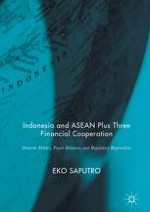2017 | OriginalPaper | Buchkapitel
2. Explaining Financial Regionalism in East Asia
verfasst von : Eko Saputro
Erschienen in: Indonesia and ASEAN Plus Three Financial Cooperation
Verlag: Springer Singapore
Aktivieren Sie unsere intelligente Suche, um passende Fachinhalte oder Patente zu finden.
Wählen Sie Textabschnitte aus um mit Künstlicher Intelligenz passenden Patente zu finden. powered by
Markieren Sie Textabschnitte, um KI-gestützt weitere passende Inhalte zu finden. powered by
